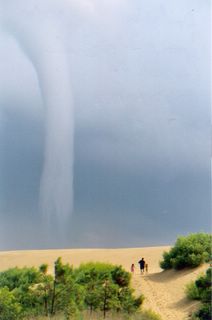Hurricanes, the National Guard and good government
posted @ 10:46 AM
-
2 comments
Several weeks ago I wrote about the relationship between National Guard deployments, the War in Iraq and the state's hurricane response readiness. As part of my preparation for that piece I e-mailed Gov. Mike Easley and asked him how Guard deployments would impact readiness. I pleased share the response that I received from Gen. William E. Ingram, Adjutant General of the North Carolina National Guard.
Before I relate the contents of the letter I want to thank Gen. Ingram for taking time to respond and for his service to our country and our state. I also want to take a moment to thank the men and women of the North Carolina National Guard for all they do and all they sacrifice on our behalf. They and their families deserve our support and our humble thanks.
Gen. Ingram's letter outlines 4 initiative's the Guard has taken to prepare for its role in the state's emergency response program. First the Guard in storm prone states are working with the Department of Defense (DOD) to ensure that the equipment necessary for response is in place. The Gen. says that North Carolina should begin to receive their allocations of needed equipment shortly. The second component in the plan is pretty simple and basic. A DOD representative will be present at the State's Emergency Operations Center (EOC). The Defense Coordination Officer (DCO) helps the State assess its emergency needs and coordinates the DOD response. This can be in the form of National Guard troops and equipment or forces from the active duty services. It is this last element that provides the third leg of the Guard's response plan. Gen. Ingram explained that resources from the states many military bases, including Camp Lejeune and Fort Bragg, are available for assistance. The General also points out that this concept, response from federal bases, is validated "almost every hurricane season as they help the State of North Carolina respond to disasters." The Generals point is all too true and the exactly why we all should be concerned about the impact of Guard deployments on emergency readiness. Finally Gen. Ingram wrote that:
The last and most important initiative is the Emergency Management Assistance Compact (EMAC). EMAC is an agreement between all 50 State and three Territorial Governors that promises assistance to fellow States in case of emergencies. We have used this in the past and have also supported other States. Most recently North Carolina sent 900 Guardsmen to help in the Hurricane Katrina Relief efforts.
It is this last element that Gov. Easley referred to when he reassured the state about emergency response readiness just before the start of hurricane season.
The title of this piece listed 3 top topics. The last may not be evident but the General's letter demonstrates it in 2 ways. First, its clear that the General and his troops take their response role seriously. The plans he describes are well conceived, closely integrated and when properly executed they should provide any level of emergency response. I was impressed by the thoroughness of the plan. Government that is this forward thinking and prepared is textbook good government. Government that is responsive is also good government. To that end the Gen. ;letter demonstrates just how good government is in North Carolina. A simple e-mail from a concerned citizen got a thorough follow up. It would like to tell you that this is how it always happens in government but its not. All credit to the Governor, General Ingram and their staffs for understanding just how important it is to respond to the public with thorough honest information. Gen. Ingram acknowledges that current deployments have "taken a toll" on Guard readiness. His planning takes those circumstances into account. His response doesn't ignore the issue either.
No one wants to see National Guard trucks rolling into their community yet when they do roll in, few people will be more welcome or appreciated. I'll close as I opened, thanking Gen. Ingram and the entire North Carolina National Guard family for their service and sacrifice, lets hope any trips to Nags Head are recreation rather than response.








2 Comments:
What a great post post Bob!!!!
I hope we don't have to see the guard here anytime soon, but I'm glad they are there... just in case.
You did our guardsman honor with this post.
Bob,
Regardless of how well prepared North Carolina's National Guard is, we're screwed if the Federal Government doesn't change its attitude about its role in responding to catastrophes. You can read about some of these issues in this article, http://www.washingtonmonthly.com/features/2005/0509.franklin.html, which recounts work done to fix FEMA after Hurricane Andrew in 1992. (I led the congressional review of FEMA and planted this story.) Bottom line is this--when a big one hits, the state and local government are overwhelmed...and the federal government then has to become involved in a leadership role to reconstitute the state and local responses. It's perfectly constitutional to do this, despite the protestations of the Bush Administration, as this article points out. http://blog.washingtonpost.com/thedebate/2005/09/facts_and_rumor.html
Post a Comment
<< Home